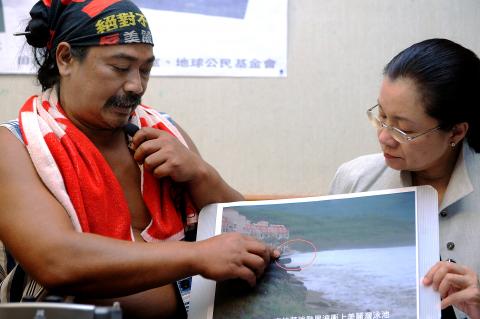Environmentalists yesterday appealed to the Ministry of the Interior to tear down a resort in Taitung County, saying the local government had refused to do so despite two court rulings revoking the results of an environmental impact assessment (EIA) and a construction permit for the hotel.
“The controversy surrounding Miramar Resort Village can be concluded in two sentences: ‘It should not have been built in the first place. It should be torn down,’” Citizen of the Earth Taiwan chairman Liao Pen-chuan (廖本全) told a press conference.
He said the beach on which the resort is standing was first designated a “general protected area” in the 1980s by the ministry and was reclassified with the more restrictive label of “coastal natural protected area” a few years ago.

Photo: Chu Pei-hsiung, Taipei Times
“I would like to ask the ministry who is protected in the coastal natural protected area? Is it the coast, or the interests of corporates?” Liao asked. “If the local government is unwilling to tear down the illegal building, the ministry should take over the job.”
The Supreme Administrative Court in Kaohsiung revoked Miramar Resort’s EIA in January and its construction permit earlier this month, said Toby Tsai (蔡中岳), manager of Citizens of the Earth Taiwan’s Eastern Taiwan Office.
“According to the Environmental Impact Assessment Act (環境影響評估法), a construction permit can only be issued for a construction project after it passes an EIA, and so, even without the court ruling earlier this month, the construction permit should have been revoked,” Tsai said.
When the court revoked the EIA, the Taitung County Government argued that the construction permit was still valid, since it was issued before the EIA was revoked.
However, when the court ruled that the construction permit was invalid, the county government said the resort had applied for a new EIA and that it would wait to see if the resort fails to pass the EIA before deciding whether to demolish the hotel.
Istanda Hosunyan Nabu, an Amis musician from Taitung, looked at the issue from a different angle.
“The county government never took the opinions of Amis Aborigines into consideration, although the resort is located within a traditional Amis domain,” he said. “It was quite ridiculous when Taitung County Commissioner Justin Huang (黃健庭) said the Amis have long ‘occupied’ the land.”
“It is our land,” Nabu said. “We have been living there since before the Republic of China regime came to Taiwan.”
Hsieh Wei-sung (謝偉松), an official representing the ministry’s Construction and Planning Agency, said there were illegal elements involved in the construction of the resort, and it should be torn down.
“But it’s the local government which has the authority to demolish it,” he said.

A Taiwanese software developer has created a generative artificial intelligence (AI) model to help people use AI without exposing sensitive data, project head Huang Chung-hsiao (黃崇校) said yesterday. Huang, a 55-year-old coder leading a US-based team, said that concerns over data privacy and security in popular generative AIs such as ChatGPT and DeepSeek motivated him to develop a personal AI assistant named “Mei.” One of the biggest security flaws with cloud-based algorithms is that users are required to hand over personal information to access the service, giving developers the opportunity to mine user data, he said. For this reason, many government agencies and

The National Fire Agency on Thursday said a series of drills simulating a magnitude 8.5 earthquake would be held in September to enhance the government’s emergency response capabilities. Since earthquakes cannot be predicted, only by continuously promoting disaster prevention measures could Taiwan enhance its resilience to earthquakes, agency Director-General Hsiao Huan-chang (蕭煥章) said in a news release. The exercises would be held to mark annual National Disaster Prevention Day on Sept. 21, the aim of which is to test Taiwan’s preparedness and improve its earthquake resilience in case of a major temblor, Hsiao said. As part of those drills, an earthquake alert would

DEFENSE: The National Security Bureau promised to expand communication and intelligence cooperation with global partners and enhance its strategic analytical skills China has not only increased military exercises and “gray zone” tactics against Taiwan this year, but also continues to recruit military personnel for espionage, the National Security Bureau (NSB) said yesterday in a report to the Legislative Yuan. The bureau submitted the report ahead of NSB Director-General Tsai Ming-yen’s (蔡明彥) appearance before the Foreign and National Defense Committee today. Last year, the Chinese People’s Liberation Army (PLA) conducted “Joint Sword-2024A and B” military exercises targeting Taiwan and carried out 40 combat readiness patrols, the bureau said. In addition, Chinese military aircraft entered Taiwan’s airspace 3,070 times last year, up about

STRICTER ENFORCEMENT: Taipei authorities warned against drunk cycling after a sharp rise in riding under the influence, urging greater public awareness of its illegality Taipei authorities have issued a public warning urging people not to ride bicycles after consuming alcohol, following a sharp rise in riding under the influence (DUI) cases involving bicycles. Five hundred and seven people were charged with DUI last year while riding YouBikes, personal bicycles, or other self-propelled two-wheelers — a fourfold increase from the previous year, data released by the Taipei Police Department’s Traffic Division showed. Of these, 33 cases were considered severe enough to be prosecuted under “offenses against public safety,” the data showed. Under the Road Traffic Management and Penalty Act (道路交通管理處罰條例), bicycles — including YouBikes and other